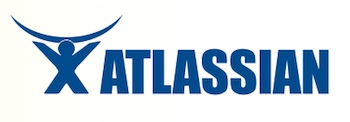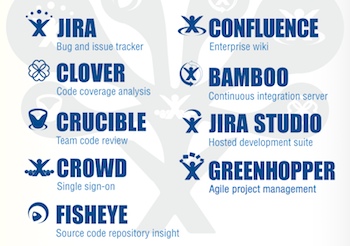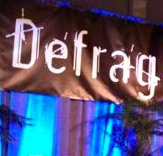In the wiki software space, there are many players, as you might expect — a lot of them open-source solutions, some with companies behind them, some not. But I learned recently that one company is experiencing a real growth tear in the adoption of its software. Mindtouch is a company I first met in 2006 in the Twin Cities, where they were then co-headquartered (they’ve since consolidated in San Diego, one of my other favorite places). 
Mindtouch launched at DEMOfall 2006, and I wrote about them in a few posts of my extensive coverage of that event here (or just type their name into my search box).
The company’s products include (1) Deki Wiki, which is a free open-source wiki and application
platform for communities and enterprises, and (2) Nexus, a wiki publishing system and social media integration platform aimed at online media applications. The latter allows blending of editorial staff-produced, syndicated, and community-generated content into one integrated page; an example of one customer using it is the San Diego Union-Tribune, for its AmplifySD community music site. The company describes its products and services as "making collaboration easy in the enterprise and
harnessing the people’s voice in online wiki communities."
When I read an article recently in Information Week that compared various options for content management systems, including wikis, I thought it was strange Mindtouch wasn’t included. So, I asked cofounder Aaron Fulkerson, who was equally perplexed. "We’re seeing 500 too 600 installations of our software every single day, and yet many in the media don’t seem to know us," he said. 
"We’ve seen 2304%
growth in adoption in the last year. And a 1666% growth in just the
last three months." Similar open-source companies,
like SugarCRM and Zimbra, he told me, have had $20-30M in investment and drive
similar adoption rates to what MindTouch has achieved with just a $3.5M
investment to date. I say that’s a pretty powerful entrepreneurial story. "We’ve achieved the success we have so far by being open, honest, and
authentic. We listen to our tribe," said Fulkerson.
I decided, on Fulkerson’s suggestion, to compare MindTouch’s stats to Zimbra’s, using stats from SourceForge. MindTouch in the last two months has had 28,656 downloads and is trending up.
Zimbra in the last two months has had 30,431 downloads (after subtracting the 2,038 of these downloads that are Flash demos), and has been pretty
flat for the last year. "Zimbra is an open source industry darling," says Fulkerson.
"These guys have had mad press and many millions of dollars in
investment." [Note: More than $20M in VC.] "They’re
right up there with SugarCRM, Alfresco, and other newcomers in the open
source space that have had significant recognition of their success." he said. Oh, another thing about Zimbra: the company was just acquired by Yahoo! for $350M.
So, MindTouch is close to matching Zimbra’s download numbers. And Fulkerson claims his firm is also matching the numbers of that other darling, SugarCRM. "I spoke to John Roberts,
CEO of SugarCRM, in person at the OSBC conf at the end of May
this year, and he said that SugarCRM was seeing about 500 downloads a day. Well, this is
equivalent to us. We’re now matching these companies with our
piddly $3.5M of angel investment and little marketing or PR
budget. These other companies have had way more investment."
I do find it strange that the media hasn’t discovered MindTouch to any great degree yet. But I guess that’s why we have bloggers like me? 🙂 Another example of a company in this space that has had tons of media coverage is Socialtext, which has had $9M
in investment. But look at their stats: a mere 1,351 downloads in the last two months and flatlined.
In a research report soon to be published, another wiki vendor, Twiki, is touted as now getting monthly downloads in the range of 10,000. MindTouch, however, with approximately 15,000 monthly, clearly trumps that figure. Fulkerson claims Mindtouch is winning
the race when it comes to downloads in the wiki software space, and leading the pack in overall numbers — except maybe for MediaWiki, he notes, which powers Wikipedia (and has no company behind it). [He makes a case, by the way, that Wikipedia is much harder for users than his software.]
Why are MindTouch’s numbers significant? First, says Fulkerson,it’s only had product since July 25, 2006. Other products (or projects, as some are better called) have been around longer, and many of these are now seeing flat growth. "We’ve had enormous growth, and we’re still
seeing it," said Fulkerson. I have to agree that essentially equaling Zimbra’s and SugarCRM’s
numbers is pretty darn impressive.
Fulkerson said Mindtouch will be issuing a press release next week about its momentum
and growth. Additional announcements regarding products and services will come before the end of the year, he said, and more media customers are going online with the company’s Nexus product, including Gazette Company. I learned that 90% of Mindtouch’s installs are for behind-the-firewall applications.
"We’ve seen such an explosion in growth in the
last three months, we still aren’t certain who everyone is that is using
our software. This will become more clear in the next couple months," he said.
UPDATE 3:00 pm: To make a couple of editorial revisions.
 You have to love the story: a couple of 22-year-old university dropouts in Sydney decide to start a company together, because they see problems with the state of enterprise software — it's expensive, difficult to configure, and requires huge investments in consulting to implement and years to deploy. So, they launch Atlassian in 2002, ship their first product, JIRA, and become profitable that first year. Fast forward to today: Atlassian has more than 20,000 customers and some 250 employees, on three continents. A few months ago, the company raised its first outside funding, to fuel even more growth: a $60-million investment from Accel Partners. You just don't hear too many stories of such rapid software startup success as this, certainly not coming out of Australia. (My own home country, I'm proud to say!) The company does so much to give back to the community, too, which is touched on in my interview, linked below.
You have to love the story: a couple of 22-year-old university dropouts in Sydney decide to start a company together, because they see problems with the state of enterprise software — it's expensive, difficult to configure, and requires huge investments in consulting to implement and years to deploy. So, they launch Atlassian in 2002, ship their first product, JIRA, and become profitable that first year. Fast forward to today: Atlassian has more than 20,000 customers and some 250 employees, on three continents. A few months ago, the company raised its first outside funding, to fuel even more growth: a $60-million investment from Accel Partners. You just don't hear too many stories of such rapid software startup success as this, certainly not coming out of Australia. (My own home country, I'm proud to say!) The company does so much to give back to the community, too, which is touched on in my interview, linked below.  Atlassian is really a different kind of software company, one that's rewritten the rules of enterprise software development and sales. Its bug tracking, collaboration and software development tools allow companies to work smarter and faster — and these tools are especially attractive for startups and small teams. Altassian offers a special package of six of its products, generally for up to 10 users each, for just $10. It's called the Starter program. But, get this: at Defrag 2010, I picked up on an even better offer for cash-strapped startups: how's free? Yes, lucky readers, it's the Free Starter program, which gets you fully functional licenses to all six products, including 12 months of support and updates. The promo code is ATLDEFR10 (and note the offer expires April 1, 2011). Now, let's get right to my interview so you can hear more about this amazing new breed of sofware company: Atlassian….
Atlassian is really a different kind of software company, one that's rewritten the rules of enterprise software development and sales. Its bug tracking, collaboration and software development tools allow companies to work smarter and faster — and these tools are especially attractive for startups and small teams. Altassian offers a special package of six of its products, generally for up to 10 users each, for just $10. It's called the Starter program. But, get this: at Defrag 2010, I picked up on an even better offer for cash-strapped startups: how's free? Yes, lucky readers, it's the Free Starter program, which gets you fully functional licenses to all six products, including 12 months of support and updates. The promo code is ATLDEFR10 (and note the offer expires April 1, 2011). Now, let's get right to my interview so you can hear more about this amazing new breed of sofware company: Atlassian….



Recent Comments